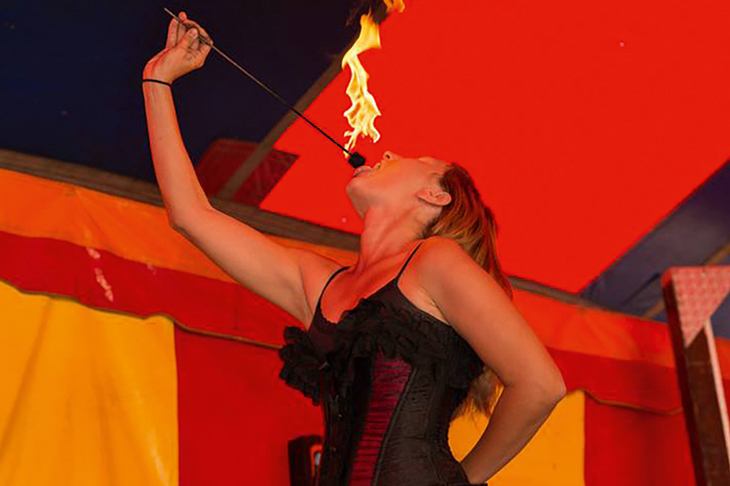In 2013 Tessa Fontaine joined up with the World of Wonders, a circus sideshow that travels around the United States each year displaying sword-swallowers, human-headed spiders, snake-charmers and fire-eaters to a marvelling/cynical public. Sideshows, as Fontaine writes, ‘are where people come to see public displays of their private fears’, and to probe their disgust reflexes and their yearnings. Here, too, they come to tread the line between relinquishing themselves to magic and uncovering, once and for all, the trick.
Yet as Fontaine discovers in her first flame-eating lesson, the trick is simply that there is no trick. Flame-eaters get burnt; sword-swallowers die of wounds inflicted by carelessly inserted blades. If you see pain, there is pain — or did you imagine that the show people were a special breed who feel nothing when they hammer nails up their noses? The only way is to feel the pain and fear and to overcome it. ‘Wow,’ says her flame-eating teacher, impressed: ‘You don’t have many instincts for self-preservation.’
Why do people do it? In Fontaine’s case, it was the result of a private tragedy. Two years previously, her mother had suffered a catastrophic stroke. Two years of slow steps towards recovery followed by fits and fevers that obliterated all her progress, of the family being repeatedly summoned to her bedside to say their last words. For her daughter, this ghastly emotional rollercoaster (sorry) was exacerbated by guilt at their difficult relationship. When her stepfather decided to take her mother on a longed-for holiday to Italy, Fontaine was convinced that her mother wouldn’t survive the trip. So she ran away to the circus.
The sinister side of the sideshow, to my mind, is not so much the car-crash voyeurism as the sense one has of applauding and rewarding self-harm; and it’s certainly true that some very damaged people pass through the tentflaps of the World of Wonder. The circus has traditionally been a sanctuary for outsiders and misfits, but on the wall of the truck is a long list of names of those who ‘can’t hack it’. Physical toughness is required to survive a season on the road, with its 17-hour days of manual labour followed by shows. Yet it’s the psychological toughness that singles out those who will make it. In Fontaine’s case, the World of Wonder provides her with a strange, dramatised space to process her loss and to transform herself.
Joan Didion’s magical thinking is here in abundance — this is a summer of plea-bargaining with the gods: If I’m brave, as brave as my mother has always been, if I do all these things I’m terrified of, then surely she’ll live… The pain of scorching her own face, of setting her arms alight, exorcises the helplessness Fontaine feels at her mother’s suffering. Her terror of feeling the squeeze of a boa constrictor around her neck is more bearable than the fear of her mother’s death. The adrenaline surge of each performance echoes the horrible ups and downs of two years of ambulances and last words — yet here each panic ends in applause, delighted crowds and children speechless with wonder. In a way it’s a sort of penance, the burden of bereavement become physical. More powerfully, however, it’s a glorious, sequinned affirmation of life and vitality. The World of Wonder defies death, one show at a time.
Fontaine herself (stage name: Mimi L’Amour) comes across endearingly; a squeaky-clean literature graduate, she says: ‘So they’ve noticed how hard I’m working!’ when she is given the vile jobs no one else wants. There are rather too many one-sentence paragraphs, and remarks such as ‘new worlds call for new yous’ and ‘two women choosing to be awake in the world’ for me to agree with Publishers’ Weekly’s verdict that the book is beautifully written.
By the end of the summer, however, she has passed through a whole series of impressive initiation rites, including being eaten by a papier mâché monster and getting into a fight with another show girl. At last two climactic moments coincide: she plays the Electric Woman who lights up lightbulbs with her teeth, and her mother in her wheelchair returns from Italy in time to watch her. It’s a genuinely touching denouement to this original debut. Somewhere in the US, on the back wall of a clapped-out World of Wonders truck, you’ll find the ultimate accolade: ‘Tessa hacked it.’


















